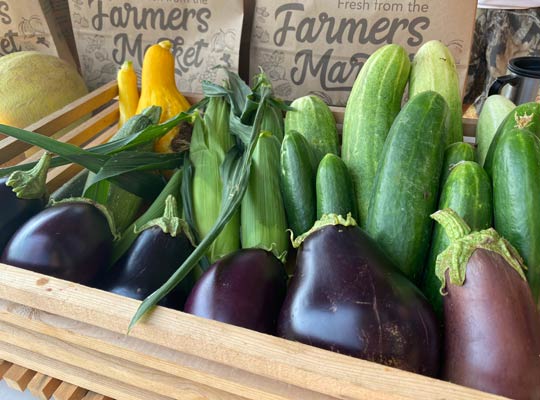Arkansas Farmers Markets
 The United States Department of Agriculture (USDA) reports that in 2022, 3.8% of Arkansas'
nearly 38,000 farmers engaged in direct sales of agricultural food items.
The United States Department of Agriculture (USDA) reports that in 2022, 3.8% of Arkansas'
nearly 38,000 farmers engaged in direct sales of agricultural food items.
Nearly all of the 1,436 direct marketing farms used farmers markets as a primary marketing channel to distribute their products. Total sales from direct marketing exceeded $8.5 million.
Across the U.S., farmers markets continue to allow consumers to connect directly with farmers and ranchers producing flavorful farm fresh products. The influence of these direct markets continues to serve as a viable marketing channel. These types of markets allow producers continued exploration of strategies to connect with their consumers and capture higher marketing margins. Consumers continue to expand and search for ways to better understand and connect to the sources of their food.
Advances and technology have fueled this momentum allowing for cost effective and transparent frameworks for buyers and sellers to not only engage for transactions but also connect building relationships and a deeper understanding of agricultural product offerings.
Direct-to-consumer marketing surged during the pandemic and have continued to attract strong consumer interest across the country.
Farmers markets are just one of many direct marketing outlets which also include internet sales, buyers' groups, and farm stands. The U.S. Department of Agriculture’s Agricultural Marketing Service no longer reports the number of farmers markets operating in Arkansas, but the Arkansas MarketMaker program reveals 64 markets currently operating across the state.
What is a Farmers Market?
 A farmers market is a form of direct marketing in which producers from a local area
gather for the purpose of selling their own produce directly to the consumer.
A farmers market is a form of direct marketing in which producers from a local area
gather for the purpose of selling their own produce directly to the consumer.
How does farmers markets enhance communities?
By selling directly to consumers, producers can sell their products at the retail price level, rather than accepting lower wholesale prices typically offered by retailers.
This direct-to-consumer approach enables producers to maximize their profits by retaining a larger portion of the revenue for themselves, thereby bypassing the need to share profits with middlemen in the distribution chain.
Additionally, the direct to consumer social connections that are facilitated by farmers markets allow producers and consumers to build relationships that are mutually beneficial to both in terms of understanding and satisfying each others needs. Producers can interact with customers to understand specific customer needs or wants in the marketplace and/or changes in taste and preferences.
Conversely, consumers gain additional satisfaction from purchasing food produced locally and like knowing not only who produced their food but also the manner in which their food was produced.
The ultimate winner is the local community which is enhanced by the multiplier effects of the relatively higher proportion of the dollars spent on local purchases recirculating in the local economy.
Farmers Markets Offer a Wide Range of Benefits
Farmers markets offer a host of benefits ranging from an enhanced sense of community to support for local businesses and basic economic development.
Benefits include:
-
Empowering small farm operators: Providing a centralized marketplace for small farm operators, allowing them to distribute a diverse range of products and expand their market reach.
-
Connecting farmers and consumers: Offering farmers direct access to markets, enabling them to supplement farm income, while granting consumers access to locally grown, farm-fresh produce and fostering personal interactions with the growers.
-
Promoting community well-being: Facilitating nutrition education, fostering wholesome eating habits, and enhancing food preparation skills, while also bolstering the local economy through farmers' markets.
Helpful Resources:
MarketMaker
This free online resource allows farmers to register to promote their operations and
product offerings. The searchable database allows consumers to easily locate markets
and farm businesses.
How to Start a Food Business in Arkansas
Ready to launch your food business? Find resources to help you succeed in the food
processing industry. Learn about market research, regulatory requirements, product
development, and scaling up production.
National Ag Law Center
The Center provides a wealth of legal resources to assist those interested in understanding
the liability and regulatory issues of local food marketing.
Food Science Department
UA Food Science offers a wealth of resources to assist growers in understanding value
added processing options as well as food safety issues including recommended production
practices to reduce the risks of food safety incidents.
Locally Grown Produce Calendar